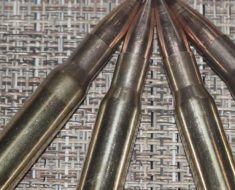“Precision and Performance: Choosing the Perfect AR15 Ammo for Your Rifle”
Bullet Weight and Type
When it comes to choosing the right ammunition for your AR15 rifle, there are several factors to consider. One of the most important factors is the bullet weight and type. The bullet weight refers to the weight of the projectile itself, while the bullet type refers to the design and construction of the bullet.
Bullet weight plays a crucial role in determining the performance of the ammunition. Heavier bullets typically have more mass and therefore more energy, which can result in greater stopping power and better penetration. On the other hand, lighter bullets may travel faster and have flatter trajectories, making them more suitable for long-range shooting.
The most common bullet weights for AR15 rifles are 55 grain, 62 grain, and 77 grain. The 55 grain bullet is a popular choice for general-purpose shooting, as it offers a good balance of speed and accuracy. The 62 grain bullet is slightly heavier and is often used for longer-range shooting or hunting. The 77 grain bullet is the heaviest of the three and is typically used for precision shooting or long-range competitions.
In addition to bullet weight, the type of bullet you choose can also have a significant impact on performance. There are several different types of bullets available for AR15 rifles, including full metal jacket (FMJ), hollow point, and soft point.
Full metal jacket bullets are typically used for target shooting and training, as they offer good penetration and are less likely to deform upon impact. Hollow point bullets, on the other hand, are designed to expand upon impact, creating a larger wound channel and increasing stopping power. These bullets are often used for hunting or self-defense. Soft point bullets are a hybrid of the two, offering some expansion while still retaining good penetration.
When choosing the right bullet weight and type for your AR15 rifle, it’s important to consider your intended use for the ammunition. If you’re primarily shooting targets at the range, a lighter bullet weight and full metal jacket may be the best choice. If you’re hunting or using the rifle for self-defense, a heavier bullet weight and hollow point or soft point bullets may be more appropriate.
It’s also important to consider the twist rate of your rifle’s barrel when selecting ammunition. The twist rate refers to the rate at which the rifling in the barrel twists, which can affect the stability and accuracy of the bullet. Different bullet weights may perform better with different twist rates, so it’s important to match your ammunition to your rifle’s twist rate for optimal performance.
In conclusion, when determining the right AR15 ammo for your specific rifle, it’s important to consider the bullet weight and type. By understanding the differences between various bullet weights and types, as well as considering your intended use for the ammunition, you can select the best ammo for your rifle. Additionally, matching your ammunition to your rifle’s twist rate can help ensure optimal performance and accuracy.

Barrel Twist Rate
When it comes to choosing the right ammunition for your AR15 rifle, there are several factors to consider. One important factor to take into account is the barrel twist rate of your rifle. The barrel twist rate refers to how many inches it takes for the rifling in the barrel to make one complete revolution. This measurement is typically expressed as a ratio, such as 1:7 or 1:9.
The barrel twist rate of your rifle plays a crucial role in determining the type of ammunition that will perform best in your firearm. Different twist rates are optimized for different bullet weights and types, so it’s important to understand how to match the right ammo to your specific barrel twist rate.
For example, a barrel with a 1:7 twist rate is best suited for heavier bullets, such as those weighing 62 grains or more. This twist rate is designed to stabilize longer and heavier bullets, allowing them to fly accurately and consistently downrange. On the other hand, a barrel with a 1:9 twist rate is better suited for lighter bullets, typically weighing around 55 grains.
To determine the twist rate of your AR15 rifle, you can usually find this information stamped on the barrel itself. If you’re unsure or can’t find this information, you can always consult the manufacturer’s website or contact them directly for clarification.
Once you’ve determined the twist rate of your rifle’s barrel, you can then select the appropriate ammunition for optimal performance. It’s important to match the bullet weight and type to your specific twist rate to ensure accuracy and reliability.
When selecting ammunition for your AR15 rifle, be sure to consider the intended use of your firearm. Are you using it for target shooting, hunting, or self-defense? Each of these applications may require a different type of ammunition, so it’s important to choose wisely.
If you’re unsure about which ammunition is best for your specific rifle, don’t hesitate to seek advice from knowledgeable professionals or experienced shooters. They can provide valuable insights and recommendations based on their own experiences and expertise.
In conclusion, the barrel twist rate of your AR15 rifle is a critical factor to consider when selecting ammunition. By understanding how twist rates affect bullet stabilization and performance, you can make informed decisions about which ammo is best suited for your specific firearm. Take the time to research and experiment with different types of ammunition to find the perfect match for your rifle. With the right combination of barrel twist rate and ammo, you can maximize the accuracy and effectiveness of your AR15 rifle.
Muzzle Velocity
When it comes to choosing the right ammunition for your AR15 rifle, there are several factors to consider. One of the most important factors is muzzle velocity. Muzzle velocity refers to the speed at which a bullet leaves the barrel of the rifle. This speed can have a significant impact on the performance of the ammunition and the rifle itself.
The muzzle velocity of a bullet is typically measured in feet per second (fps). The higher the muzzle velocity, the faster the bullet will travel and the more energy it will have when it hits its target. This can result in greater accuracy and stopping power, especially at longer distances.
When selecting ammunition for your AR15 rifle, it is important to consider the intended use of the rifle. If you are using your rifle for hunting, you may want to choose ammunition with a higher muzzle velocity to ensure a clean and ethical kill. On the other hand, if you are using your rifle for target shooting or competition, you may be more concerned with accuracy and consistency, rather than raw speed.
Another factor to consider when determining the right muzzle velocity for your AR15 rifle is the twist rate of the barrel. The twist rate refers to the rate at which the rifling in the barrel twists, which affects the stability of the bullet as it travels down the barrel. A faster twist rate is generally better for stabilizing heavier bullets with higher muzzle velocities, while a slower twist rate may be better suited for lighter bullets with lower muzzle velocities.
It is also important to consider the type of ammunition you are using when determining the right muzzle velocity for your AR15 rifle. Different types of ammunition, such as full metal jacket (FMJ), hollow point, or soft point, can have different muzzle velocities and performance characteristics. It is important to choose ammunition that is compatible with your rifle and intended use.
When selecting ammunition for your AR15 rifle, it is important to do your research and consult with experts to ensure you are choosing the right ammunition for your specific rifle. Consider factors such as muzzle velocity, twist rate, and the type of ammunition to determine the best option for your needs.
In conclusion, muzzle velocity is an important factor to consider when selecting ammunition for your AR15 rifle. By understanding the impact of muzzle velocity on performance and accuracy, as well as considering factors such as twist rate and ammunition type, you can choose the right ammunition for your specific rifle and intended use. Remember to do your research and consult with experts to ensure you are making the best choice for your needs.
Manufacturer Recommendations
When it comes to choosing the right ammunition for your AR15 rifle, it’s important to consider the manufacturer’s recommendations. Each rifle is designed to work optimally with a specific type of ammunition, and using the wrong ammo can not only affect your rifle’s performance but also potentially damage it.
Manufacturers typically provide guidelines on the type of ammunition that is best suited for their rifles. This information can usually be found in the owner’s manual or on the manufacturer’s website. It’s important to follow these recommendations to ensure that your rifle functions properly and safely.
One of the key factors to consider when choosing ammunition for your AR15 is the caliber. The most common calibers for AR15 rifles are .223 Remington and 5.56x45mm NATO. While these calibers are similar, there are some differences that you need to be aware of.
The .223 Remington is a civilian round and is typically used for target shooting and hunting. It has slightly lower pressure compared to the 5.56x45mm NATO, which is a military round. Using 5.56x45mm NATO ammunition in a rifle chambered for .223 Remington is generally safe, but the reverse is not recommended. It’s always best to stick with the caliber that your rifle is designed for.
Another important consideration is the bullet weight. Different rifles are designed to work best with specific bullet weights, so it’s important to choose ammunition that falls within the recommended range. Using bullets that are too heavy or too light can affect accuracy and performance.
In addition to caliber and bullet weight, you should also consider the type of bullet. There are several different types of bullets available, including full metal jacket (FMJ), hollow point (HP), and soft point (SP). Each type of bullet is designed for a specific purpose, so it’s important to choose the right one for your needs.
For target shooting and plinking, FMJ bullets are a good choice as they are affordable and offer good penetration. For hunting, HP or SP bullets are typically preferred as they expand upon impact, causing more damage to the target.
It’s also important to consider the quality of the ammunition. Cheaper, lower-quality ammunition may not be as reliable or consistent as higher-quality ammunition. It’s worth investing in good quality ammunition to ensure that your rifle functions properly and reliably.
In conclusion, when choosing ammunition for your AR15 rifle, it’s important to consider the manufacturer’s recommendations. Pay attention to the caliber, bullet weight, type of bullet, and quality of the ammunition to ensure that your rifle functions optimally. By following these guidelines, you can ensure that your rifle performs well and stays in good condition for years to come.
Personal Preference and Testing
When it comes to choosing the right ammunition for your AR15 rifle, personal preference and testing are key factors to consider. With so many options available on the market, it can be overwhelming to determine which ammo is best suited for your specific rifle. However, by taking the time to test different types of ammunition and considering your own preferences, you can find the perfect match for your AR15.
One of the first things to consider when selecting ammunition for your AR15 is the type of shooting you will be doing. Are you a competitive shooter looking for precision and accuracy, or are you a casual shooter looking for affordable options for plinking at the range? The type of shooting you will be doing will greatly influence the type of ammunition you should choose.
For competitive shooters, match-grade ammunition is often the best choice. Match-grade ammunition is specifically designed for accuracy and consistency, making it ideal for precision shooting. While match-grade ammunition may be more expensive than other options, the improved performance is well worth the investment for serious shooters.
On the other hand, if you are a casual shooter looking for affordable options for plinking at the range, bulk ammunition may be a better choice. Bulk ammunition is typically less expensive than match-grade ammunition and is perfect for recreational shooting. While bulk ammunition may not offer the same level of precision as match-grade ammunition, it is more than sufficient for most shooting activities.
Once you have determined the type of shooting you will be doing, it is important to test different types of ammunition to find the best match for your AR15. Testing different types of ammunition will allow you to see how each performs in your rifle and help you determine which one works best for your specific needs.
When testing ammunition, it is important to consider factors such as accuracy, reliability, and recoil. Pay close attention to how each type of ammunition performs in your rifle and take note of any differences you observe. By testing different types of ammunition, you can find the perfect match for your AR15 and ensure optimal performance.
In addition to testing different types of ammunition, it is also important to consider your own preferences when selecting ammunition for your AR15. Some shooters may prefer a certain brand or type of ammunition based on past experiences or recommendations from others. By taking your own preferences into account, you can narrow down your options and find the best ammunition for your specific rifle.
Ultimately, choosing the right ammunition for your AR15 is a personal decision that requires careful consideration and testing. By taking the time to test different types of ammunition and considering your own preferences, you can find the perfect match for your specific rifle. Whether you are a competitive shooter looking for precision and accuracy or a casual shooter looking for affordable options, there is a wide range of ammunition available to suit your needs. Take the time to explore your options and find the best ammunition for your AR15 to ensure optimal performance and enjoyment on the range.




